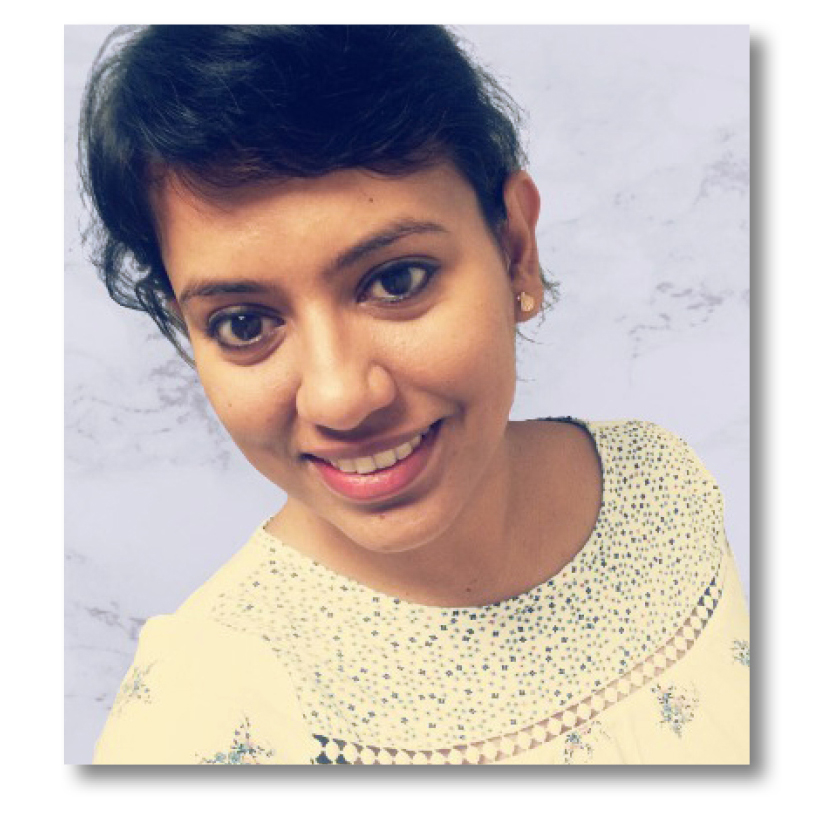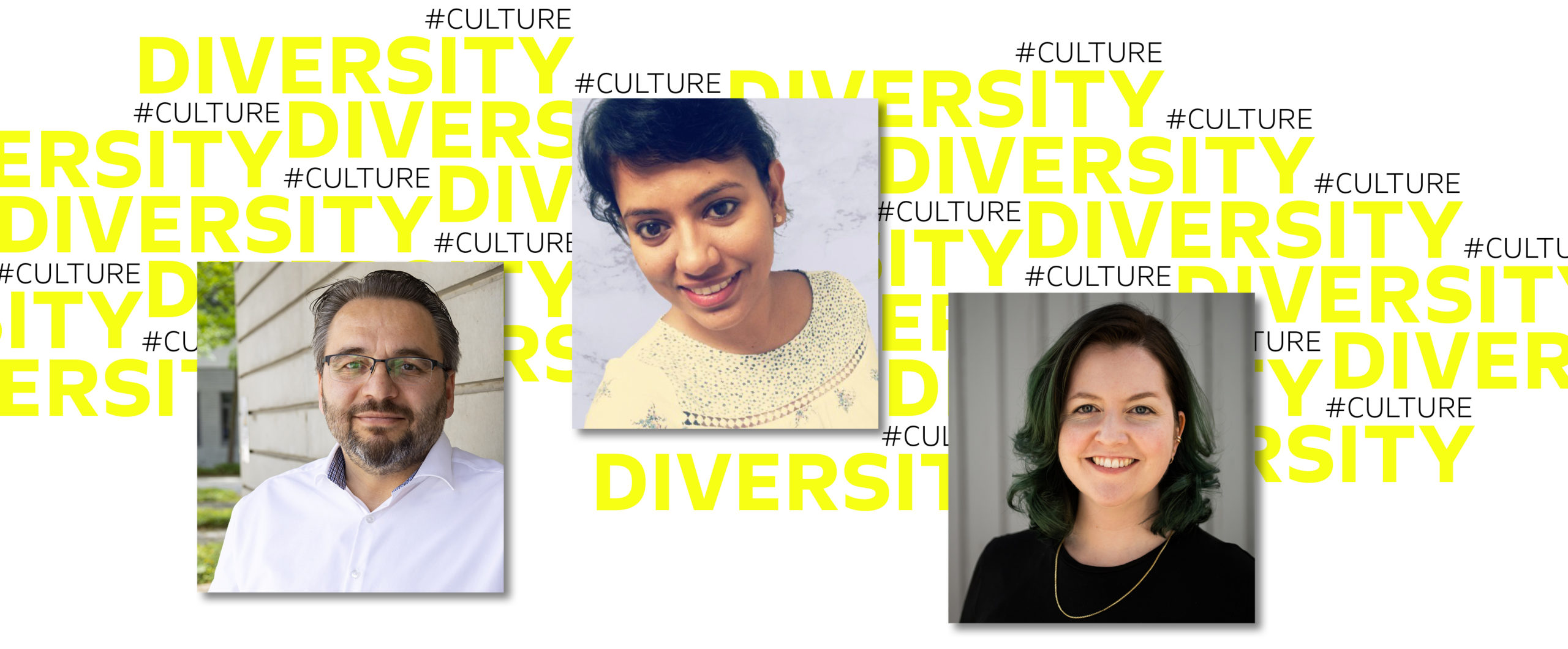The fact is: there is no company without a corporate culture. It is created when people come together in all their diversity and work together. In the process, common values emerge. They become visible and tangible in the biographies of the employees. On German Diversity Day, we arranged to meet Dorothee Reinhardt, Manju Tojan and Selcuk Kurban to talk about their experiences and to shed light on the values that are filled with life throughout the company.

“I had the basic trust that everything would be fine.”
– Dorothee Reinhardt –
The memory is still present. Of how the sporty contours emerged more precisely from the mouldable clay with every step of the work: “We stood shoulder to shoulder, the red-brown clay in our hands, and realised: The new Astra will be a unique model.” That was in 2017, when Dorothee Reinhardt had been with the company for seven years. She had completed an apprenticeship as a technical model maker and then qualified as a product designer. The Astra was her first project as a clay modeller – “everything was perfect.” And yet she didn’t hesitate to look for another job in the company when it became apparent that the clay modelling team was going to downsize. “I had confidence that everything would be fine,” she says. This basic trust had built up over time, through the appreciation of her work, her commitment“. That also included the offer of a temporary break in 2014, so that I could continue studying to become a product designer. Afterwards I just went straight back to work at Opel – that was anything but a matter of course,” she emphasises.
Excel instead of clay
Equipped with this basic confidence, she plunged into her new job in the summer of 2020 – as Assistant Brand Manager. But she could only do a fraction of what was required in the internal job advertisement: “I didn’t have a business degree and whether it was PowerPoint or Excel – every programme was new for me.” But she pushed through, from the home office, with “great support from colleagues.” And so the 31-year-old not only shaped the Astra from clay, but also helped to introduce the newcomer from Rüsselsheim to customers across Europe a few weeks ago in TV commercials, on giant posters and in magazines with a 360-degree campaign. “Whether it’s developing campaign motifs, organizing shoots, selecting photos: I can also exploit my creative streak in my new role,” says the new marketing colleague. And the basic trust in being in the right company – that has continued to grow.
“Wow, a job offer from Opel!” After a Master of Technology in Communication Engineering at one of the best universities in India, a Master of Science in Electrical Engineering in Darmstadt and three years‘ worth of experience as an applications engineer at an automotive supplier in southern Germany, Manju Tojan didn’t have to think twice: “This was the perfect next step in my career.” In the field of “Noise, Vibration, Harshness” (NVH) she was able to contribute her experience, expand her expertise, and make her mark in the professional sense, here, at Opel. But she felt alienated in the beginning: “The team was great, the colleagues nice. But I was the only woman and, at 27, the youngest, by far. And when I became pregnant during my probationary period, I was worried that my career at Opel would be over before it had really begun,” she says. But things turned out differently. One of her experienced colleagues realised that she needed a reliable mentor and pillar to manage this chaos. “Ulrich Zimmer, a great colleague and wonderful person, became a kind of father figure for me,” Manju Tojan recounts. “Unfortunately he is no longer with us, but he will always have a special place in my heart.” He opened her eyes to the fact that parental leave did not have to be a setback for her career.
Advanced possibilities
And that’s exactly how it happened: When Manju Tojan came back to the company, she was able to get back on track professionally; plus the merger of PSA with Fiat-Chrysler to form Stellantis opened up new perspectives. “We have group-wide responsibility for NVH performance of electrical systems across global vehicle platforms,” says the Performance Integration Engineer, with her eyes shining with pride. Of course it is challenging to manage her daily work with noise and vibration tests, the tests in climatic chambers and on roller test benches and the many calls, “but I love my work. The cohesion in the team and the exchange with colleagues worldwide help me contribute my best every day.” Mobile working helps a lot in balancing her professional duties with those of a mother of a six-year-old son. And when there is a need to talk, she exchanges ideas with her colleagues in the “Women of Stellantis“ network. “The mutual support is inspiring and much needed for any woman trying to live the best of both lives, family and career,” she says. The journey was long and eventful and when asked “How’s life at Opel”, she does not hesitate to answer that she is “happy, absolutely happy”.

“Flexible mobile working helps with having a demanding job and being a mother.”
– Manju Tojan –

“The cohesion among the colleagues in Rüsselsheim is huge.”
– Selcuk Kurban –
“I’m an Opelaner through and through,” Selcuk Kurban introduces himself on the phone and adds: “I’m a group leader with an immigrant background.” Did his family and cultural background ever play a role in the company? “Not to any extent,” he says without hesitation. What did play a role, however, was his will to get involved and take on responsibility. Thus, the 47-year-old, who joined the company in 1991 as an apprentice electronics technician, is now the personnel manager for more than 2,000 employees. This includes colleagues from production, facility management and logistics at the Rüsselsheim plant. Selcuk Kurban wanted to get involved early on. In his second year of apprenticeship, he became involved in the youth representation of the works council. Later, when he was a test driver at the Dudenhofen proving ground, he also represented the interests of the employees.
Diversity as DNA
And issues such as equal opportunities, diversity and respect continue to drive him today as Group Human Resources Manager. “In my long time with the company, I have often experienced how enriching it is when people with different backgrounds and experiences come together,” he describes. The cohesion among the colleagues in Rüsselsheim is still huge today. Kurban: “Basically, diversity is our DNA.” After all, people from around 50 nations work at the plant in Rüsselsheim. The youngest are 20, the most experienced colleagues over 60. And a lot is happening at the moment. “We are hiring new colleagues for a second shift, and the selection of the next generation of foremen is underway,” he says. He is pleased that more women are considering craft professions – “this brings in new perspectives, enriches the teams.” And also the fact that Opel has been a leader in the employment of severely disabled employees in the automotive industry for more than 20 years shows that diversity and integration in the company not only exist on paper – “it is actively lived.”
May 2022
